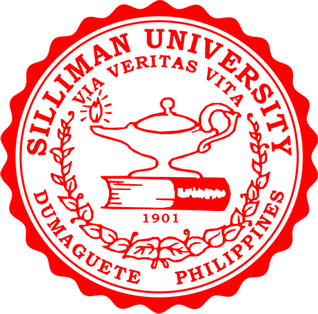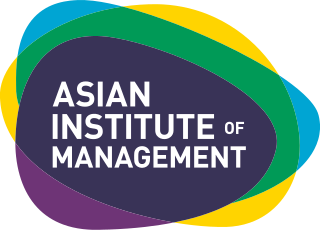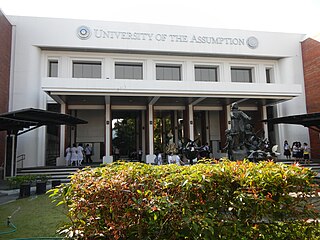
Ateneo de Manila University, also known simply as Ateneo de Manila or Ateneo, is a private, Catholic, teaching and research university, as well as a basic education institution in Quezon City, Philippines. Founded in 1859 by the Jesuits, it is the second-oldest Jesuit-administered institution of higher learning in the Asia-Pacific.
Development communication refers to the use of communication to facilitate social development. Development communication engages stakeholders and policy makers, establishes conducive environments, assesses risks and opportunities and promotes information exchange to create positive social change via sustainable development. Development communication techniques include information dissemination and education, behavior change, social marketing, social mobilization, media advocacy, communication for social change, and community participation.

Silliman University is a private research university in Dumaguete, Philippines. Established in 1901 as Silliman Institute by the Presbyterian Board of Foreign Missions, it is the first American and Protestant founded institution of higher learning in the Philippines.

The University of Asia and the Pacific is a private university in the Philippines. It traces its beginnings to the Center for Research and Communication (CRC), which was established on August 15, 1967, as a private think-tank that conducted economic and social research and offered graduate courses in economics.

The University of San Carlos is a private, Catholic, research, coeducational basic and higher education institution administered by the Philippine Southern Province of the Society of the Divine Word missionaries in Cebu City, Philippines, since 1935. It offers basic education and higher education. Founded originally in 1595 as Colegio de San Ildefonso, it later became the Colegio-Seminario de San Carlos in 1783 and finally obtained university charter in 1948.

The University of the Philippines Manila is a public, coeducational, research university located in Ermita, Manila, Philippines. It is known for being the country's center of excellence in the health sciences, including health professional education, training, and research. It is the oldest of eight constituent universities of the University of the Philippines System, and predates the founding of UP by three years. It was originally established on December 1, 1905, as the Philippine Medical School and later renamed as the UP College of Medicine and Surgery on June 10, 1907. In 1983 it was renamed as University of the Philippines Manila.

The Asian Institute of Management (AIM) is a management school and research institution in Makati, the Philippines. Established in partnership with Harvard Business School, it is one of the few business schools in Asia to be internationally accredited with the Association to Advance Collegiate Schools of Business (AACSB). Stephen H. Fuller of the Harvard Business School was its first president. It was described by Asiaweek magazine as the best in the Asia-Pacific region in terms of executive education.

Lyceum of the Philippines University, also referred to by its acronym LPU, is a private, non-sectarian, coeducational higher education institution located at intramuros in the City of Manila, Philippines. It was founded in 1952 by José P. Laurel, who was the third president of the Republic of the Philippines.

West Visayas State University is a public normal research university located in La Paz, Iloilo City, Western Visayas region of the Philippines. It was established in 1924 as Iloilo Normal School under the tutelage of the Thomasites, but dates back its founding in 1902 as a part of Philippine normal school system with Iloilo National High School established by the American colonial government. It later became West Visayas State College in 1965 and acquired its university status becoming West Visayas State University in 1986.

Bicol University, also referred to by its acronym, is a regional state, research and coeducational higher education institution in Legazpi City, Albay, Philippines, with external campuses scattered throughout the provinces of Albay and Sorsogon. BU is an ISO 9001:2008 certified public university.

The University of the Assumption (U.A.) is a private archdiocesan Catholic university in the City of San Fernando, Pampanga, Philippines. The University of the Assumption is the first Catholic archdiocesan university in the Philippines and in Asia. It is among the top schools in the region, based on its accredited programs, and licensure and professional examination results.
Education in the Philippines is compulsory at the basic education level, composed of kindergarten, elementary school, junior high school, and senior high school. The educational system is managed by three government agencies by level of education: the Department of Education (DepEd) for basic education; the Commission on Higher Education (CHED) for higher education; and the Technical Education and Skills Development Authority (TESDA) for technical and vocational education. Public education is funded by the national government.

The Philippine Normal University is a public coeducational teacher education and research university in the Philippines. It was established in 1901 through Act No. 74 of the Philippine Commission "for the education of natives of the Islands in the science of teaching". It has campuses in Manila, North Luzon, South Luzon, Visayas, and Mindanao. Pursuant to Republic Act No. 9647, it is the country's National Center for Teacher Education.

Science and technology in the Philippines describes scientific and technological progress made by the Philippines and analyses related policy issues. The main agency responsible for managing science and technology (S&T) is the Department of Science and Technology (DOST). There are also sectoral councils for Forestry, Agriculture and Aquaculture, the Metal Industry, Nuclear Research, Food and Nutrition, Health, Meteorology, Volcanology and Seismology.
Action for Economic Reforms (AER) is a Philippine non-government organization engaged in research and advocacy. It was founded in 1996 by a group of progressive scholars and activists as an "independent, reform-oriented and activist policy group".

The Polytechnic University of the Philippines is a coeducational state university in Manila, Philippines. It was founded on 19 October 1904, as the Manila Business School (MBS) and as part of Manila's public school system. It was eventually promoted to a chartered state university in 1978, by virtue of Presidential Decree 1341. PUP has more than 20 Campuses across Central Luzon, Southern Luzon and Metro Manila. With over 80,000 enrolled students, PUP claims to be the largest state university in the Philippines by student population.

Pasig Catholic College, also referred to as PCC, is a private Catholic coeducational basic and higher education institution located in Pasig, Philippines and was founded by CICM fathers in 1913. It is considered as the central catholic educational institution and the cathedral school of the Diocese of Pasig and a part of the Pasig Diocesan School System and the Manila Archdiocesan Parish and School Administration.

Far Eastern University, also referred to by its acronym FEU, is a private research non-sectarian university in Manila, Philippines. Created by the merger of Far Eastern College and the Institute of Accounts, Business and Finance, FEU became a university in 1934 during the term of its first president, Nicanor Reyes Sr.

The IBON Foundation is a non-profit research, education and information-development institution with programs in research, education and advocacy based in the Philippines. It provides socioeconomic research and analysis on people's issues to various sectors. It aims to contribute to people's empowerment through education and advocacy support. The foundation is also engaged in international solidarity work.
Mel Velasco Velarde is a Filipino businessman. He is chairman of the Filipino telecommunications conglomerate, Now Corporation and NOW Telecom, and chairman and CEO of the Asian Institute of Journalism and Communication (AIJC). He is known for acquiring the Murillo Velarde 1734 Map, regarded as "The Mother of All Philippine Maps," through an auction at Sotheby's London in 2014. The map served as critical evidence in the Philippines’ win against China's claim over the West Philippine Sea in 2016.



















